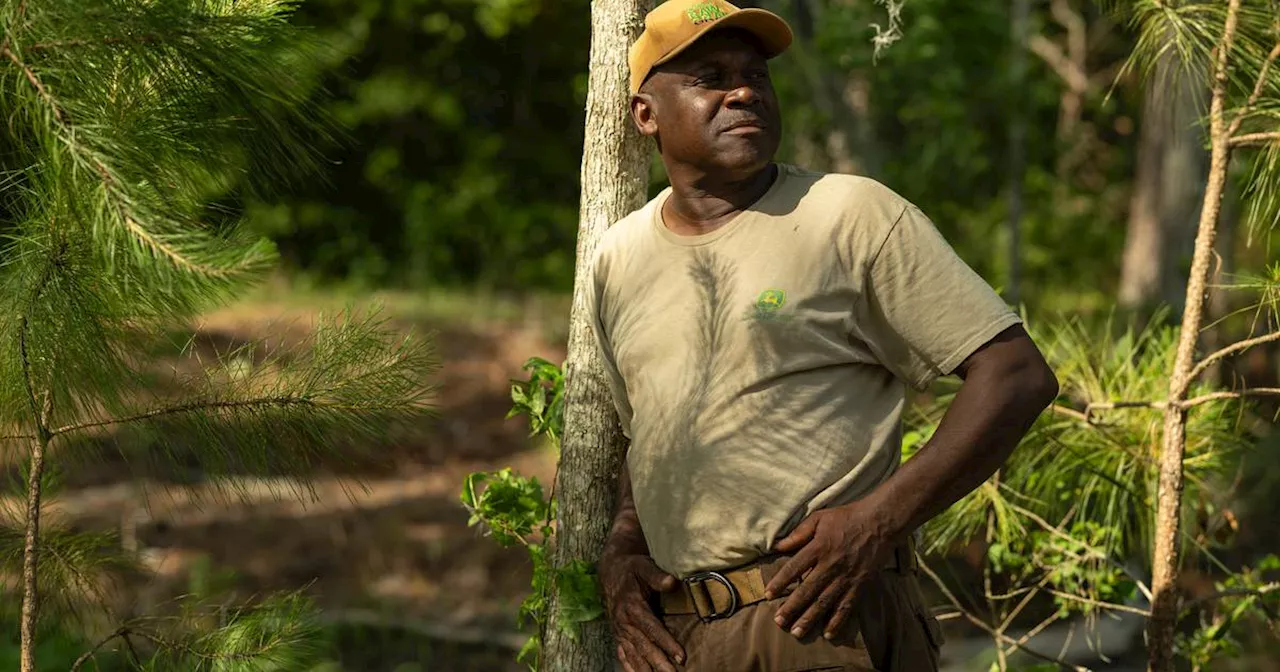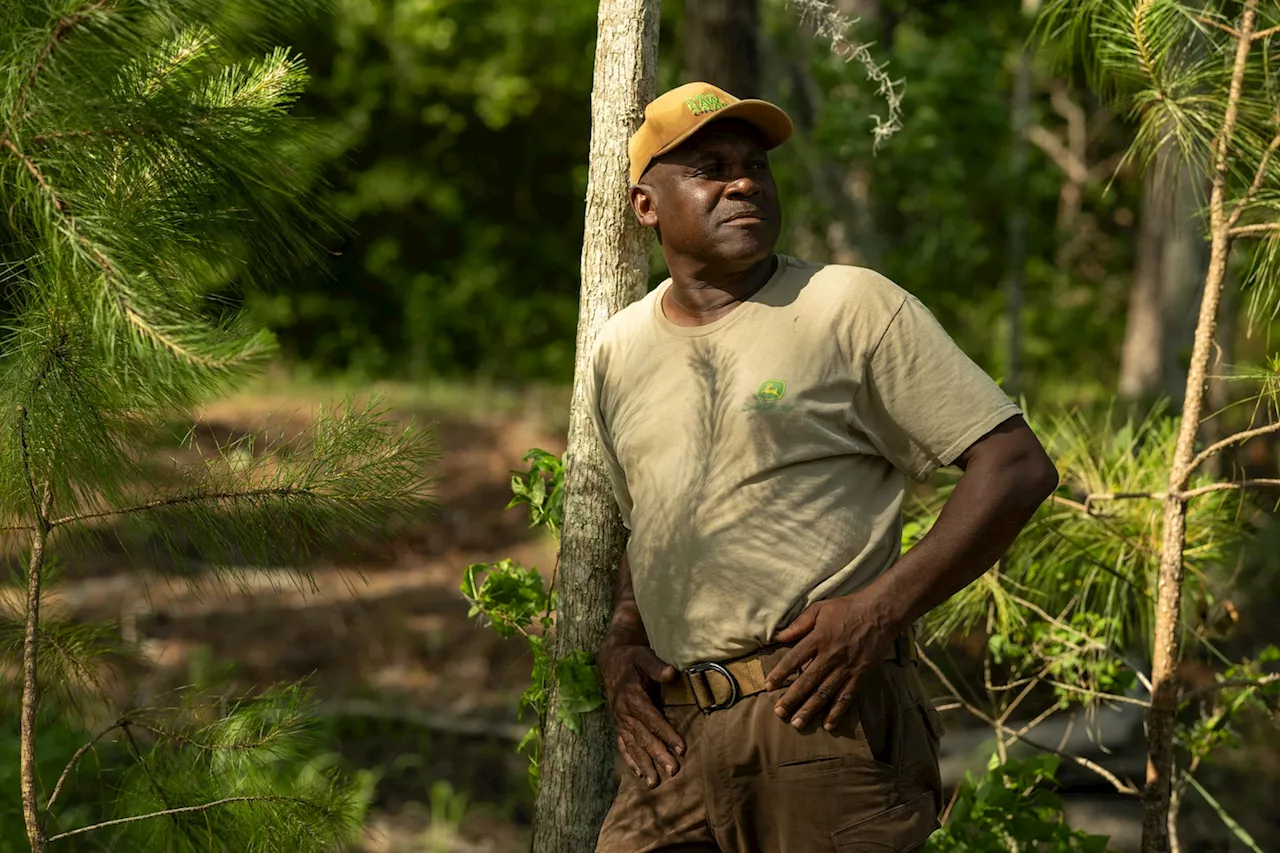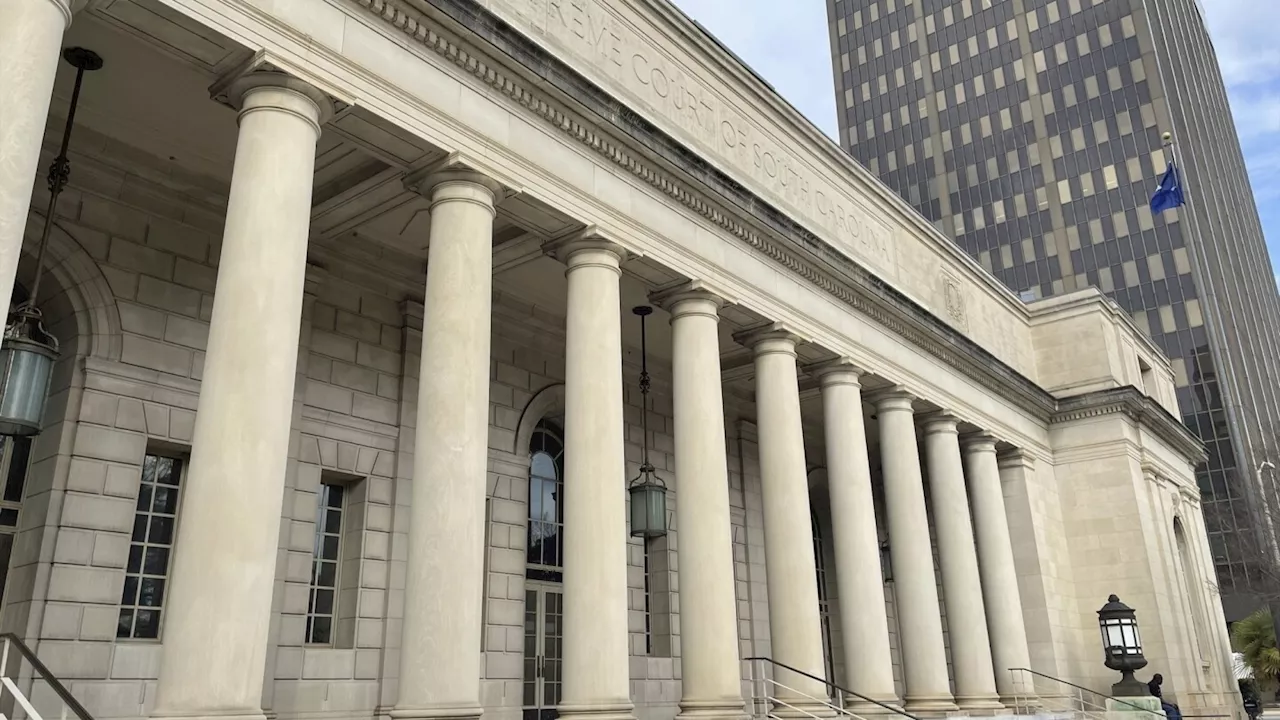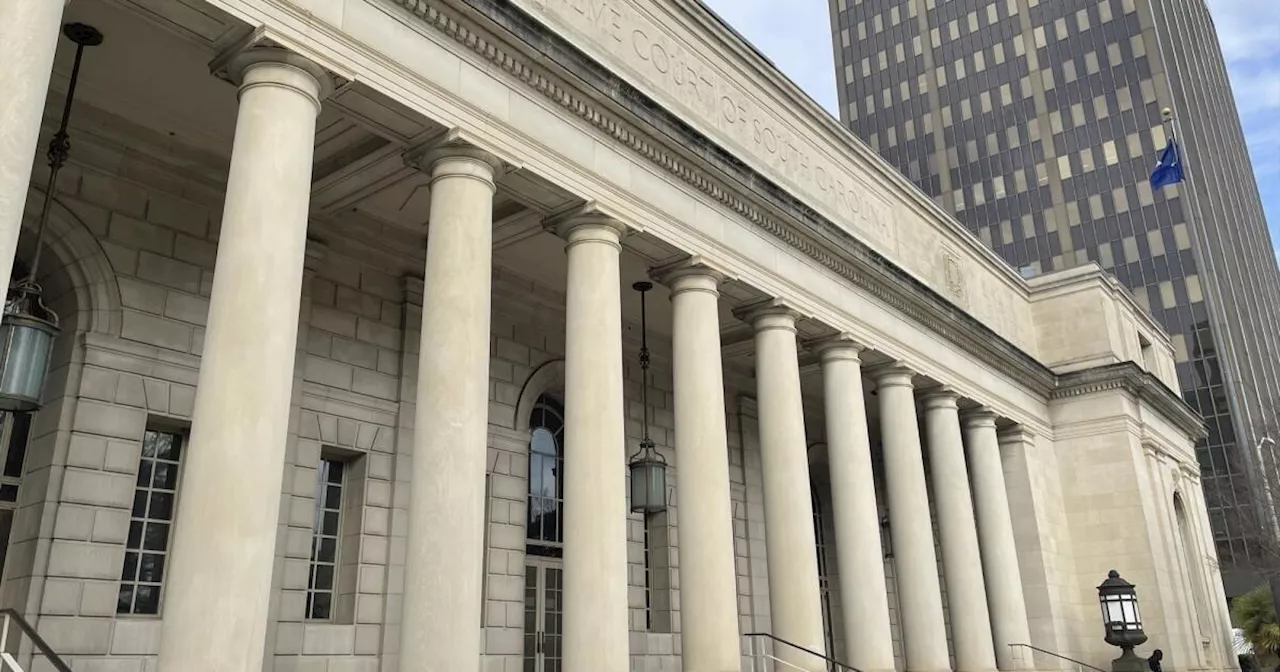With civil rights education under threat, a preservationist works to persuade Black families to turn private land over for public memorials.
STONE MOUNTAIN, Ga. — Hank Thomas settled into the recliner in his living room, drifting in and out of sleep. His wife, Yvonne, pulled a blanket over his chest. It
Hank Thomas and his wife, Yvonne, talk about his blanket's central photo, which shows him outside a bus that had been bombed because he and other Freedom Riders were on it.hoping to hear a revelation. When he first met Thomas a few years back, Howardjob. Instead, he joined an organization attempting to preserve the history of the civil rights movement.
One of several signs planted along Highway 80 to mark the 54-mile Selma-to-Montgomery march that Martin Luther King Jr. led in 1965. Howard spends most of his days driving his white pickup truck along Alabama’s winding roads, his dad’s old World War II veteran hat dangling from his rearview mirror. He rolls
The bus station in Anniston, Ala., where Hank Thomas and other Freedom Riders were attacked is now a monument. Visitors can hear Thomas's story from a speaker under the commemorative plaque. In the midst of the pandemic, Howard volunteered to moderate conversations with the last two living original Freedom Riders at Zoom events commemorating the 60th anniversary of their actions.Charles Person shows a photo of a White mob beating him in 1961. He and Hank Thomas are the last two living original Freedom Riders.
There were four “campsites” where protesters stayed overnight while completing their 54-mile sojourn.the City of St. Jude, an old hospital campus with a church and school — and to transfer the property to the city of Montgomery. Howard hoped to help the city construct affordable housing, a park and maybe even a long-desired grocery store across the street.
Cheryl Gardner Davis walks on her family farm, one of four campsites where participants of the Selma-to-Montgomery march stayed.Howard, she was the daughter of Robert Gardner, who had welcomed marchers at a campsite about seven miles away from St. Jude. She figured there was little to lose in having a conversation. If another campsite family called, she’d be courteous but brief.Fifteen minutes after Howard hung up, Davis’s phone rang again. It was DaVine Hall-McGuire, the granddaughter of David and Channie Hall, whose farm had hosted the marchers on the first night after they crossed the bridge.Hall-McGuire, now 50, had grown up outside Los Angeles and worked as a hairdresser. She was loquacious and warm, like her mother.
“We had not been involved in civil rights at the time,” Mary Gardner explained to her daughter on the day she showed her the magazine. “This would be our contribution.”parents had a different approach. When she was growing up, her mother continually talked about the bravery exhibited by her grandfather.
It all felt so special, so when Hall-McGuire was in sixth grade, she wrote an essay for class about her family legacy. The teacher thought she was making it up. One generation removed from the actual march, Hall-McGuire realized that the memory of her family’s contribution was already beginning to wane.
By then, he had also contacted relatives of Rosie Steele, who hosted the marchers on the second night at a property between the Hall and Gardner farms. Steele had told people she was not afraid to host marchers, according to reports. She was 78 and had lived longer than the “three score and ten” that the Good Book had prescribed. But her family believed she ultimately paid a price for her actions. After hosting marchers, Steele’s house and her store mysteriously burned down.
The money could help Davis’s family, too — the roof was sinking in Robert Gardner’s old home, its shingles were chipped and the glass windows were busted open. Davis was afraid to even walk inside, fearful that critters might have taken up residence. Howard tried to find other ways to help. He offered to set them up with an attorney who specializes in heir disputes over properties — but neither family felt they were ready to involve lawyers. He sent out a questionnaire so families could do a survey about what to do next. He found another grant that could help pay architects to draw up blueprints and make digital renderings, so there could be at least some record of the properties in case they were destroyed by some act of God.
Hall-McGuire originally agreed to the renderings, and then decided the idea left her cold. Hall-McGuire’s grandfather, until the day he died, told his family never to sell his land because it belonged to them. “His family was everything,” she said. “Black ownership meant everything. Self-sufficiency meant everything.”
“The Four Spirits” statue in Birmingham honors the four young girls who were killed in the 1963 bombing of the 16th Street Baptist Church. From right, DaVine Hall-McGuire, Rozelia Steele-Harris and Cheryl Gardner Davis attend an event at the church at the City of St. Jude. Their family properties were campsites during the march to Montgomery, as was the City of St. Jude.
But did she really need to hang on to her childhood house, a place in such disarray that even she would not enter? Maybe she could wrap her mind around opening the farm up occasionally for preplanned tours. Maybe she could even allow someone to redo the home. Davis shows the Jet magazine page that featured her father, Robert Gardner, who invited participants of the 1965 march to stay at his farm.
Mary Hall-McGuire and her husband, Johnnie McGuire, walk on a path overlooking the Alabama River during a visit to a sculpture park in Montgomery. Johnnie McGuire stands in awe of the National Monument to Freedom. The sculpture lists 122,000 surnames of formerly enslaved Black people, copied from the 1870 Census.
Hall-McGuire squinted her eyes in the sun. The image evoked her grandfather, herself, her God. Everything in time.Phillip Howard prepares to drive across the Edmund Pettus Bridge. He wants to preserve all four properties that served as campsites during the Selma-to-Montgomery march. And now, Alabama lawmakers were even trying to wrest control of the state archives. Meanwhile, Black stories were kept cloistered in old closets, bullets pierced the graves of fallen civil rights heroes, and the childhood home of Coretta Scott King sat abandoned and unmarked. If people did not act quickly enough to solidify a truthful narrative about the civil rights era, Howard feared another rewriting of the public memory.
As mayor, though, Perkins had learned the limits of such feelings. Civil rights tourism had been a boon to the state economy — 4 in 10 visitors come to the state to see the civil rights sites in Montgomery, 2 in 10 go to 16th Street Baptist Church in Birmingham, according to the state tourism bureau — but his city offered little to those who sojourned there. Its downtown was speckled with boarded-up buildings and empty storefronts.
United Kingdom Latest News, United Kingdom Headlines
Similar News:You can also read news stories similar to this one that we have collected from other news sources.
 Crowned | POPSUGARStories that center Black experiences, amplify Black voices, and celebrate Black joy.
Crowned | POPSUGARStories that center Black experiences, amplify Black voices, and celebrate Black joy.
Read more »
 Timbuctoo's story: decades before Juneteenth, free Black Americans thrived in this village in South JerseyDecades before Juneteenth, free Black Americans thrived in the South Jersey community of Timbuctoo. Meet the native son trying to preserve its history.
Timbuctoo's story: decades before Juneteenth, free Black Americans thrived in this village in South JerseyDecades before Juneteenth, free Black Americans thrived in the South Jersey community of Timbuctoo. Meet the native son trying to preserve its history.
Read more »
 A Black farmer in South Carolina cultivates culture, history — and riceRice farmer Rollen Chalmers has been integral to the region’s heritage-grains revival, and now chefs and home cooks are becoming loyal customers.
A Black farmer in South Carolina cultivates culture, history — and riceRice farmer Rollen Chalmers has been integral to the region’s heritage-grains revival, and now chefs and home cooks are becoming loyal customers.
Read more »
 A Black farmer in South Carolina cultivates culture, history — and riceRice farmer Rollen Chalmers has been integral to the region’s heritage-grains revival, and now chefs and home cooks are becoming loyal customers.
A Black farmer in South Carolina cultivates culture, history — and riceRice farmer Rollen Chalmers has been integral to the region’s heritage-grains revival, and now chefs and home cooks are becoming loyal customers.
Read more »
 South Carolina's Supreme Court will soon have no Black justicesAll the justices on South Carolina’s Supreme Court are going to be white for the first time in nearly two decades. Circuit Judge Jocelyn Newman was the lone Black candidate for the state Supreme Court seat coming open. The only African American on the high court is Chief Justice Don Beatty.
South Carolina's Supreme Court will soon have no Black justicesAll the justices on South Carolina’s Supreme Court are going to be white for the first time in nearly two decades. Circuit Judge Jocelyn Newman was the lone Black candidate for the state Supreme Court seat coming open. The only African American on the high court is Chief Justice Don Beatty.
Read more »
 South Carolina's Supreme Court will soon have no Black justicesAll the justices on South Carolina’s Supreme Court are going to be white for the first time in nearly two decades
South Carolina's Supreme Court will soon have no Black justicesAll the justices on South Carolina’s Supreme Court are going to be white for the first time in nearly two decades
Read more »
